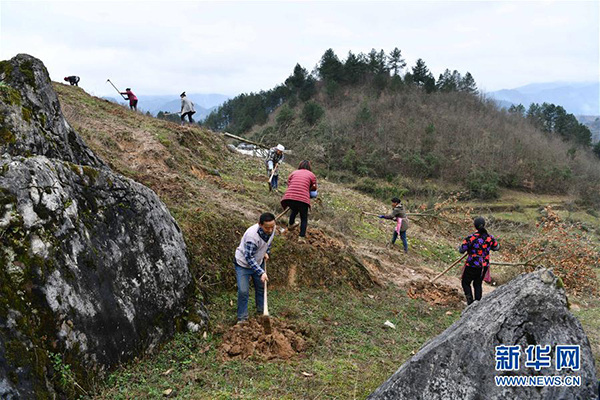Guizhou creates job and business opportunities for poverty alleviation

By the end of 2019, Southwest China's Guizhou province had 308,200 people under the poverty line, which was one ninth of the country's total impoverished population.
To help lift these people out of poverty, Guizhou's provincial officials has supervised the poverty alleviation efforts in nine counties that are deeply impoverished, and three counties with over 10,000 impoverished people.
Since the beginning of this year, Guizhou has issued 16.2 billion yuan ($2.33 billion) in funds to launch 19,000 projects and increase the income of impoverished people, of which 9,100 projects have started construction.
The counties strive to solve the problems faced by companies and to help impoverished people find jobs nearby.
Benefiting from supporting policies, such as delayed social insurance payments, preferential taxation for startups, rent reductions or exemptions for companies, as well as subsidized interest, over 1,410 poverty alleviation companies and workshops have resumed work and provided positions.
Guizhou also communicates with Zhejiang, Guangdong, and Jiangsu provinces to export human resources. By March 6, 2.6 million impoverished people have found employment.
In order to recover from the impact of the novel coronavirus outbreak, Guizhou continued to reduce inefficient crops and expanded the scale of advantage industries like tea, edible fungi, and vegetables.
At a Chinese prickly ash planting base in Xinchang village, Fengle town, Wuchuan county, thousands of workers were busy transplanting seedlings.
According to an official, the base plans to plant 300,000 mu (20,000 hectares) of Chinese prickly ash and has a labor shortage. During the spring growing season, over 300 workers at most will work at the base and earn about 100 yuan per day.

Farmers transplant Chinese prickly ash seedlings in Wuchuan county. [Photo/xinhuanet.com]
MOST POPULAR
- 1 China to give visa-free treatment to another 9 countries
- 2 China fully opens manufacturing sector to foreign investors in landmark opening up move
- 3 China's import expo attracts record-breaking participating countries, exhibitors
- 4 China's door opening even wider to foreign visitors, businesses
- 5 China revises rules to ease foreign strategic investment in listed firms
Editors' Picks
 Video:
Peru sees new port open
Video:
Peru sees new port open
 Infographic:
China's public holidays for 2025
Infographic:
China's public holidays for 2025
 Infographic:
Basic facts of APEC
Infographic:
Basic facts of APEC
 Infographic:
Wrapping up the 7th CIIE: Data recap
Infographic:
Wrapping up the 7th CIIE: Data recap



